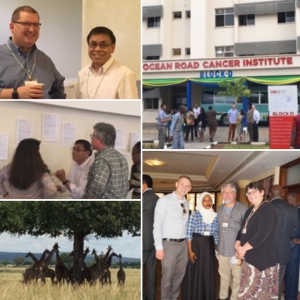NEWS AND EVENTS
Upcoming Events and Reminders
Nebraska Lecture featuring Kari Ronning, May 7
The next Nebraska Lecture in the N150 series is 3:30 p.m. at the Mary Riepma Ross Media Arts Center, 313 N. 13th St., with a reception following. Ronning, research associate professor of English, will present “Willa Cather on Campus,” an exploration of what it was like to be a student at the University of Nebraska-Lincoln in the 1890s, using Cather as an example.
Reminder to complete annual conflict of interest reporting
As a reminder, all ORED staff should complete the annual conflict of interest reporting by filing the Interest and Outside Activity Reporting Form, available through NUgrant. The form can be accessed by logging into NUgrant.unl.edu and selecting “Add New IAM Reporting Rorm” from the Quick Add Actions on the landing page. More information about conflicts of interest and the disclosure process can be found here. Specific questions about the reporting form should be directed to Emily Hanus.
KUDOS TO OUR COLLEAGUES
Bayliegh Bohn, Institutional Animal Care Program, passed the Laboratory Animal Technician, or LAT, certification exam. This is the second tier in the American Association for Laboratory Animal Science’s certification program, which sets professional standards for the advancement of laboratory animal science. The program was developed to recognize professional achievement and provide an authoritative endorsement of a technician’s level of knowledge in laboratory animal technology.
Kelly Heath, Institutional Animal Care Program, completed his first AAALAC site visit as a consultant in Minneapolis, Minnesota, in March. To serve in this role, Kelly completed an application to the AAALAC International office to be considered an ad hoc consultant, and it was accepted. Consultants must have a minimum of four years training or experience in the care or use of laboratory animals. Their experience must show they have acquired knowledge of performance standards and regulations, and have demonstrated an interest in, and commitment to, laboratory animal science. Around 180 consultants complete the site visits for the 850 AAALAC-accredited programs in 32 countries.
Dan Hoyt, director of the Social and Behavioral Sciences Research Consortium and professor of sociology, received the Louise Pound-George Howard Distinguished Career Award from the university’s faculty senate. The award recognizes an individual who has made an exceptional contribution to the university through teaching, research, public service, administration or any combination of these. He will be recognized this fall at The Laurels, UNL’s annual awards reception.
WELLNESS WATCH
Six Morning Rituals to Boost Productivity All Day
Here are a few simple things you can do to feel more energized and productive throughout your day. They are adapted from 6 Morning Rituals That Will Make You Productive All Day, written by Brian Scudamore for the April 19, 2017, edition of Forbes. Thanks to Laurie Sampson for this submission!
1. Set Your Alarm with Precision
There’s something psychological about being specific that tells your brain to pay attention. Rather than setting the alarm for 6 a.m., set it for 5:55 a.m. Soon you won’t compromise by hitting snooze and will get out of bed on time.
2. Write Down One Daily Intention
Take a moment to set your intention for the day. Writing down goals makes you significantly more likely to achieve them. This intention should be simple and attainable. And this one intention will help you stay focused throughout the day.
3. Give Yourself a Power Hour
At any time at the beginning of the day, give yourself a precious chunk of time for yourself. But never check your email during this time, as this allows others to dictate your priorities and makes you reactive rather than proactive.
4. Find a Way to Fuel Your Body Properly
Plenty can happen during your 9-to-5 that gets a healthy diet off track. But if you are intentional about the first meal of the day, when willpower is at its peak, you’ll be more successful in maintaining good habits.
5. Choose to Use Your Commute Efficiently
Keep a notepad handy for ideas that come to you while driving in to work — you can jot them down at stoplights. Schedule phone calls that can be handled hands-free so you can be productive en route. Sometimes you’re more creative because you’re in a different headspace than you are when you’re at work.
6. Get a Good Night’s Sleep
The real secret to a productive morning, though, is the night before. Before you drift off to sleep, list 10 things you’re grateful for, especially when you’ve had a bad day or something’s gone wrong. It’s a powerful reminder of the progress you’ve made with family, fitness and business. Ending your night on a positive note means that, at 5:55 when that alarm goes off, you’re ready to start a new day on the right foot.
WATER COOLER CHAT
Feeling stressed at work? To mark April’s designation as National Stress Awareness Month, your ORED colleagues shared some tips for how they cope with workplace pressure.
Kate Carlin, Sponsored Programs: “Taking a timeout. I find using a 15-minute break to get away from my desk and walk outdoors really helps me refocus and de-stress; it’s even better when our whole team goes on a walk together!”
Emily Hanus, Research Compliance Services: “I think it’s good to take breaks when you feel overwhelmed. Sometimes I will take a short walk around the building after spending time focusing on one task. It helps me shift into a new task and allows me time to adjust my perspective and remember that one stressful email or fast-approaching deadline is temporary. I also have several hobbies outside of work that are fun and give me something to look forward to during evenings or over the weekends instead of stressing about the week!”
Suzan Lund, Sponsored Programs: “Humor within our team and taking a walk.”
Thanks to all who participated! Check the May edition of OPEN Book for the next survey question. If you’d like to make a suggestion for the poll, you can do so here.
THE MONTH IN PICTURES
Last month, Bob Wilhelm and representatives from the Office of Proposal Development joined Charles Wood, Lewis Lehr/3M University Professor and director of the Nebraska Center for Virology, and his NCV team at the U54 Consortium Meeting on HIV-associated malignancies in low- and middle-income countries.
The meeting, March 27-29 in Dar es Salaam, Tanzania, was a collaborative effort by the National Cancer Institute, Fogarty International Center, Ocean Road Cancer Institute, University of Nebraska-Lincoln and University of Nebraska Medical Center. Meeting attendees included representatives from U54 programs in Argentina, Botswana, Kenya, Malawi, Nigeria, Rwanda, Tanzania, Uganda and Zambia.
NIH’s U54 program supports interdisciplinary approaches to solving significant and complex biomedical problems, particularly those that have been resistant to traditional approaches. The NCV has two NIH-funded U54 programs. Our project in Tanzania is the Cancer Research International Training and Intervention Consortium, or CRITIC, and in Zambia we have the Zambia AIDS Malignancies Diagnosis and Pathogenesis Program, or ZAMDAPP. Bob serves on the advisory board for both programs.
Bob joined other dignitaries in giving the welcome at the meeting, and OPD’s Tisha Mullen and Matthew Dwyer delivered a proposal writing workshop for meeting attendees. While in Tanzania, Bob also chaired the CRITIC board meeting and visited several institutions of higher education to explore opportunities for UNL/Tanzania collaborations. At the conclusion of the meeting, Bob traveled with NCV representatives to Lusaka, Zambia, for the ZAMDAPP board meeting and to visit the UNL/University of Zambia/University Teaching Hospital research facilities.
Tisha and Matthew squeezed in some sightseeing at Mikumi National Park and Zanzibar before returning to Lincoln.
Thanks to all who contributed to this month’s OPEN Book. If you have an item you’d like to submit for the next issue, submit it here or send it to Tiffany Lee.








